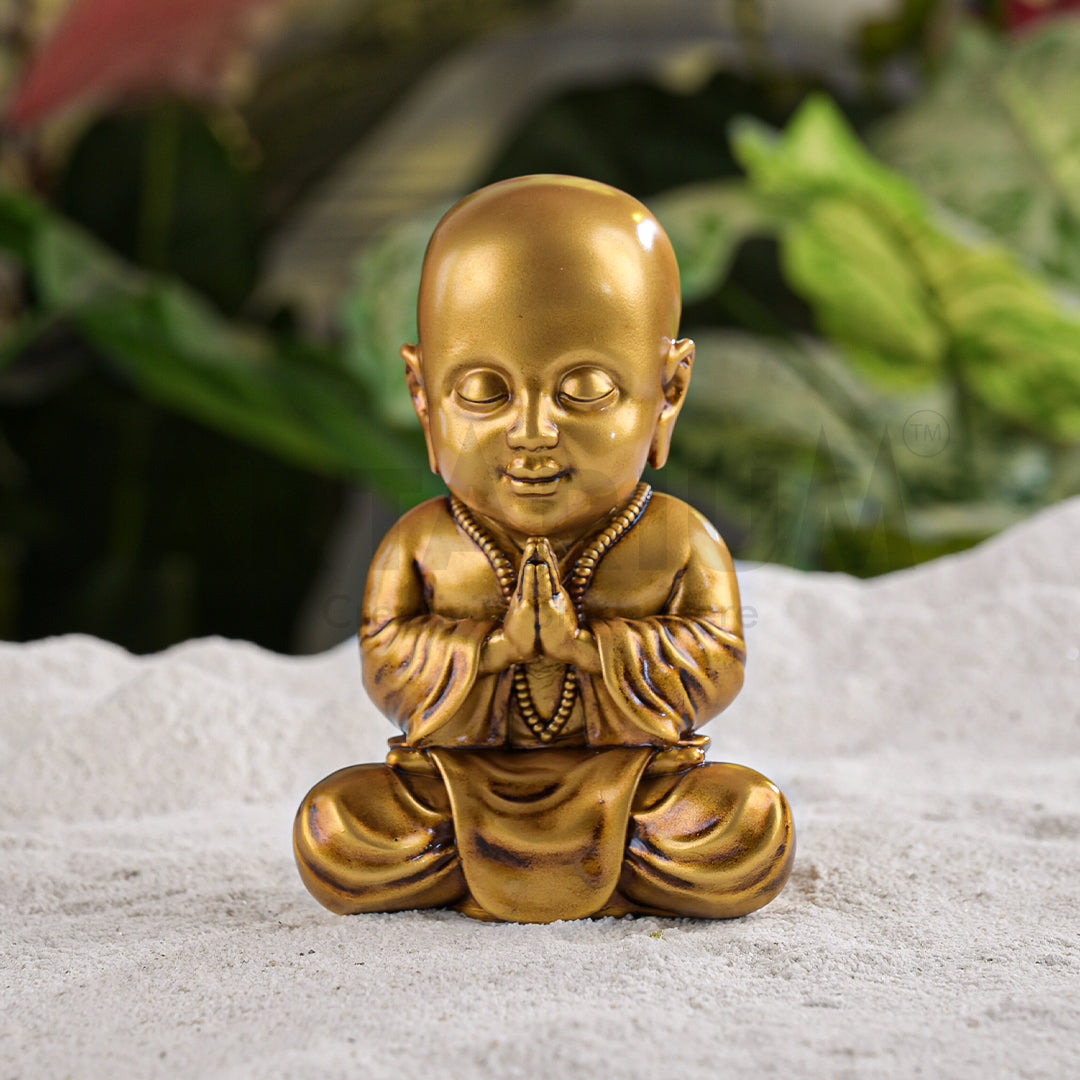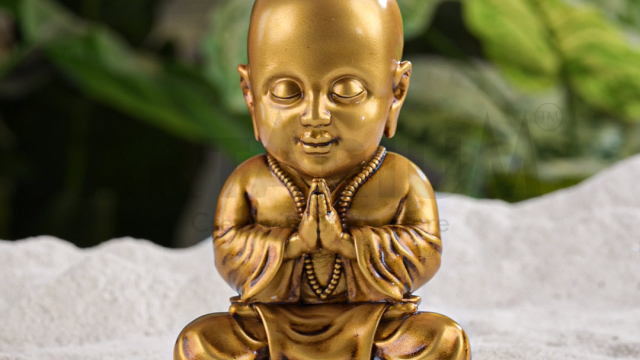This seemingly simple yet profound representation encapsulates a journey within, inviting individuals to explore the depths of their inner selves.
The closed eyes symbolize turning inward, shutting out external distractions, and focusing on the inner world. The Little Monk,

- Cultural Roots:
- The Little Monk embodies the journey towards enlightenment and self-realization.
- Hindu Connection: Shiva, often depicted in meditation with closed eyes, represents the cosmic aspect of consciousness. The Little Monk serves as a reminder of the divine potential within every individual.
- Spiritual Significance:
- Meditation and Contemplation: The closed eyes of the Little Monk convey the importance of turning one’s attention inward. Meditation and contemplation are essential practices for achieving a state of inner peace, self-awareness, and spiritual growth.
- It encourages individuals to find stability and balance within themselve,
Embracing the Symbol in Daily Life:
- Meditation Practices:
- Breath Awareness: Focus on your breath, mirroring the tranquility represented by the Little Monk. Allow each inhale and exhale to bring a sense of calm and presence.
- Mindful Living:
- Moment-to-Moment Awareness: Practice being fully present in each moment, embracing the simplicity of daily activities with a mindful attitude.
In the realm of spirituality and mindfulness, symbolism plays a profound role in channeling inner peace and enlightenment.
The closed eyes symbolize detachment from the external world and the ability to find peace and clarity amidst life’s chaos.
Embracing Stillness in a Busy World
The Practice of Meditation and Mindfulness
At the heart of the Little Monk’s message lies the practice of meditation and mindfulness. By quieting the mind and tuning into the present moment, we can access a profound sense of peace and clarity.
Finding Beauty in Simplicity
In the minimalist depiction of the Little Monk with Closed Eyes, we find beauty in simplicity.
Cultivating Compassion and Empathy.
The Symbolism of the Little Monk:
The “Little Monk with Closed Eyes” represents a symbolic embodiment of tranquility and
Cultural Roots and Spiritual Significance:
- Buddhist Influence: The little monk figure draws inspiration from Buddhist traditions, where meditation is a central practice. In Buddhism, monks devote themselves to a life of mindfulness, seeking enlightenment and inner peace.
- Zen Philosophy: Rooted in Zen philosophy, the Little Monk aligns with the principles of simplicity, humility, and mindfulness. Zen Buddhism places a strong emphasis on meditation as a means to attain enlightenment and awaken the intuitive wisdom within. The closed eyes of the little monk symbolize the detachment from the external world and the journey towards inner clarity.
- Buddhist Influence: The little monk figure draws inspiration from Buddhist traditions, where meditation is a central practice. In Buddhism, monks devote themselves to a life of mindfulness, seeking enlightenment and inner peace.
- Zen Philosophy: Rooted in Zen philosophy, the Little Monk aligns with the principles of simplicity, humility, and mindfulness. Zen Buddhism places a strong emphasis on meditation as a means to attain enlightenment and awaken the intuitive wisdom within. The closed eyes of the little monk symbolize the detachment from the external world and the journey towards inner clarity.
The Role of the Little Monk in Modern Living:
- Cultivation of Mindfulness:
- Little monks serve as embodiments of mindfulness, promoting awareness and presence in modern living.
- Through their teachings and practices, they inspire individuals to embrace mindfulness as a tool for managing stress and enhancing overall well-being.
- Simplicity and Minimalism:
- Little monks exemplify the values of simplicity and minimalism, advocating for a clutter-free and balanced lifestyle.
- Their modest way of living encourages individuals to prioritize essentials and cultivate contentment with less, reducing the emphasis on material possessions.
- Spiritual Guidance in Everyday Life:
- In the midst of hectic modern lifestyles, little monks offer spiritual guidance and wisdom grounded in ancient traditions.
- Their teachings on compassion, gratitude, and inner peace provide valuable insights for navigating the complexities of daily life.
- Emphasis on Inner Growth:
- Little monks emphasize the importance of inner growth and self-discovery over external achievements.
- They encourage individuals to embark on a journey of self-reflection, fostering personal development and a deeper understanding of one’s true nature.
- Promotion of Kindness and Compassion:
- Through their acts of kindness and compassionate teachings, little monks inspire a culture of empathy and altruism.
- Their teachings remind individuals of the interconnectedness of all beings and the importance of extending kindness to others.
- Environmental Stewardship:
- Little monks advocate for environmental stewardship and respect for nature, emphasizing the interconnectedness between humanity and the natural world.
- Their eco-friendly practices and reverence for the environment serve as a reminder of our responsibility to protect and preserve the planet for future generations.
- Cultivation of Inner Peace:
- In a world filled with noise and distractions, little monks offer a sanctuary of inner peace and serenity.
- Their practices of meditation and mindfulness empower individuals to find calm amidst chaos, promoting emotional resilience and mental clarity.
Mindfulness Practices with the Little Monk:
- Introduction to Mindfulness:
- The Little Monk serves as a gentle introduction to mindfulness, encouraging us to embrace the present moment with awareness.
- Mindfulness involves cultivating an attentive and non-judgmental awareness of one’s thoughts, feelings, and surroundings.
- Breath Awareness Meditation:
- The Little Monk often introduces beginners to mindfulness through breath awareness meditation.
- Focusing on the breath allows individuals to anchor themselves in the present, promoting relaxation and mental clarity.
- Mindful Walking with the Little Monk:
- Engaging in mindful walking with the Little Monk involves savoring each step and being fully present in the act of movement.
- This practice encourages a connection with the surrounding environment and a break from the rush of daily life.
- Gratitude Journaling:
- The Little Monk encourages the practice of gratitude journaling, a reflective exercise where individuals jot down moments of appreciation each day.
- Cultivating gratitude fosters a positive mindset and enhances our ability to find joy in simple pleasures.
- Tea Meditation Rituals:
- Sharing a cup of tea with the Little Monk becomes a mindful ritual.
- This practice involves sipping tea slowly, appreciating its aroma, taste, and warmth, fostering a sense of calm and presence.
- Mindful Eating Practices:
- The Little Monk teaches us to savor our meals mindfully, paying attention to each bite.
- This practice not only enhances the eating experience but also promotes a healthier relationship with food.
- Daily Mindfulness Affirmations:
- Incorporating daily affirmations with the guidance of the Little Monk helps set positive intentions for the day.
- Affirmations can be simple phrases that reinforce mindfulness, gratitude, and compassion.
- Mindful Technology Use:
- The Little Monk encourages mindful technology use by promoting digital detoxes and setting boundaries.
- This practice fosters a healthier relationship with technology, reducing stress and promoting present-moment awareness.
- Meditation Sessions: Incorporating the Little Monk into your meditation routine can enhance the experience.
- Daily Mindful Moments: Use the Little Monk as a prompt for brief mindful breaks throughout the day.
The Journey Within: A Personal Reflection:
Conclusion:
The Little Monk with Closed Eyes encapsulates a profound message that transcends cultural boundaries and spiritual traditions. It serves as a beacon for those seeking solace, mindfulness, and inner transformation.




